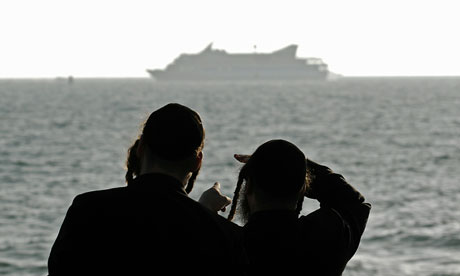Q&A: The Gaza Freedom flotilla
What were the flotilla's goals, and did Israel violate international law?
 The Mavi Marmara Two ultra-Orthodox Jews look at the Mavi Marmara off the coast of Israel. Photograph: David Buimovitch/AFP/Getty Images
The Mavi Marmara Two ultra-Orthodox Jews look at the Mavi Marmara off the coast of Israel. Photograph: David Buimovitch/AFP/Getty Images
What was the aim of the Gaza Freedom flotilla?
The Free Gaza movement says it was intended to deliver aid to Gaza to get around the Israeli blockade and "to raise international awareness about the prison-like closure of the Gaza Strip and pressure the international community to review its sanctions policy and end its support for continued Israeli occupation". The movement is an international coalition of pro-Palestinian human rights organisations and activists. It has been endorsed by Desmond Tutu and Noam Chomsky and counts on the support of a number of Jewish groups that campaign for the rights of Palestinians.
Israel's deputy foreign minister, Danny Ayalon, said: "The armada of hate and violence in support of the Hamas terror organisation was a premeditated and outrageous provocation. The organisers are well-known for their ties to global Jihad, al-Qaida and Hamas. They have a history of arms smuggling and deadly terror. On board the ship we found weapons that were prepared in advance and used against our forces. The organisers' intent was violent, their method was violent, and unfortunately, the results were violent."
Israel has singled out the Turkish-based Insani Yardim Vakfi or IHH ("humanitarian relief fund") as a radical Islamic organisation.
What has been the impact of the blockade on Gaza?
It has affected everything from sanitation to schools, agriculture to healthcare. Unemployment has soared and blackouts have become common. UN statistics show that around 70% of Gazans live on less than $1 a day, 75% rely on food aid and 60% have no daily access to water. Humanitarian aid is in theory allowed in, but UN agencies and charities claim that the Israelis have banned any items that are humanitarian in nature but could be put to alternative use. Items said to face delays getting into Gaza include shelter kits, health and paediatric hygiene kits, bedding, kitchen utensils, school textbooks and stationery. The World Bank estimates that 80% of Gaza's imports are smuggled in by tunnel. The goods, which are taxed by Hamas, attract inflated prices that are out of the reach of most ordinary residents.
Israel says the objective of the blockade is to hold Hamas "responsible and accountable" for rocket attacks on Israeli territory. It also wants to pressure the group to release Gilad Shalit, an Israeli soldier held captive for four years. Ultimately, its goal is to bring down Hamas, which it views as a terrorist organisation. The government hopes to weaken Hamas by constraining its ability to govern. Independent observers say this is not working. John Holmes, the United Nations emergency relief coordinator, has described the blockade as "collective punishment" of the civilian population of the Gaza Strip.
Was the Israeli action legal?
Israel had vowed to block the flotilla from reaching Gaza, accusing the organisers of embarking on "an act of provocation" against the Israeli military, and claiming its entry into the 20 nautical mile closure of the sea off Gaza would amount to a violation of international law. But there is mounting criticism that Israel breached international standards and human rights law through its use of armed force. International human rights law protects the right to life, and the UN has strict guidelines on the response by military and police in law enforcement situations. The use of violence is prohibited unless it is strictly necessary, and the use of lethal force can only be justified in self-defence or to protect life. Human Rights Watch said: "We are calling for a credible and impartial full investigation of the incident by the Israeli authorities."
Israeli spokespeople have insisted that the attack was an act of self defence but international law also requires that any use of force is proportionate.
Questions have also been raised about the violation of international maritime law by Israel, after reports that the flotilla was around 80 miles from Gaza's coast when Israeli commandos boarded.
The Israeli human rights group B'Tselem said that an independent and effective investigation, conducted by non-military officials, needs to ask whether the army used proportionate force, whether the forces were trained to cope with this type of event, whether they were correctly equipped, what open-fire regulations were given to the soldiers, and whether alternative options were considered.
What are the likely political repercussions?
"Proximity talks" between Israel and the western-backed Palestinian Authority resumed this month but there is little expectation of any meaningful progress. The authority is at odds with the Islamists of Hamas, who control the Gaza Strip, but Mahmoud Abbas, the Palestinian president, angrily condemned Israel's "massacre".
International reaction to Israel may provoke a rethink of the policy of shunning Hamas. Today's events quickly prompted calls for an easing or lifting of the blockade of Gaza. Israel says it wants peace and will continue to seek a solution through negotiations.
• This article was amended on 1 June 2010. In the original Human Rights Watch was quoted as calling for "a credible and partial" investigation by Israel. This has been corrected.